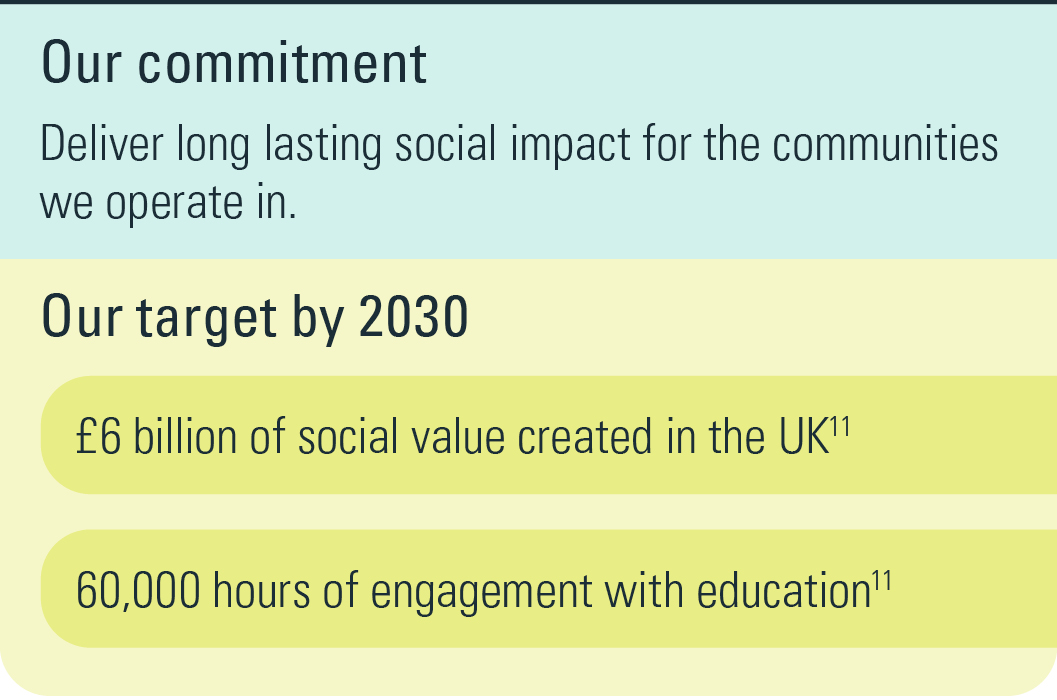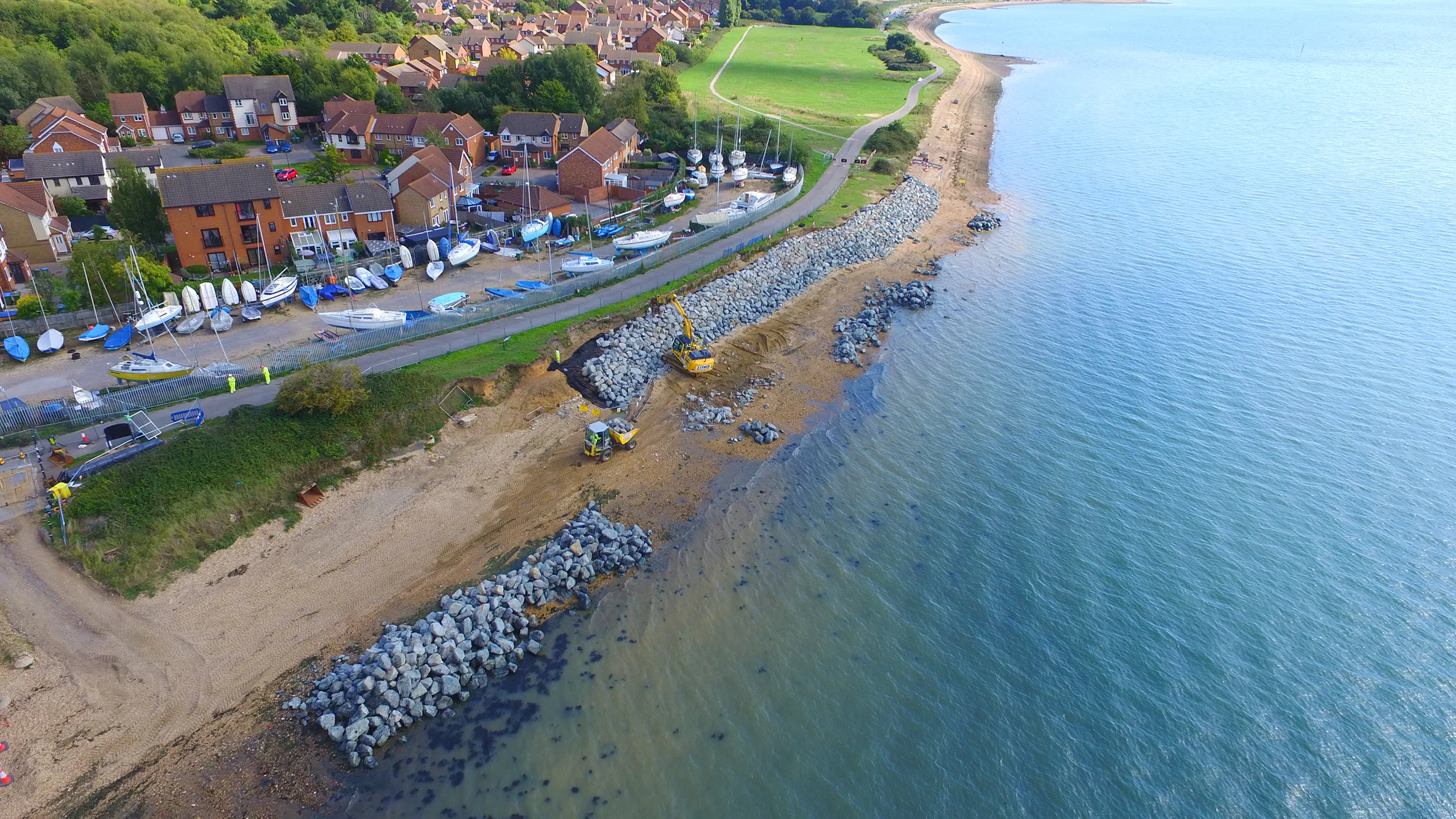Delivering long-lasting social benefit is at the heart of our operations. We strive to create opportunities for local communities and businesses to thrive, while also inspiring the next generation to pursue careers in infrastructure. We’re committed to making a meaningful difference in the communities we serve and Building New Futures.
In 2024, we surpassed our target of creating £3 billion of social value by 2025. Building on that success, we have set a new target to generate a further £6 billion of social value in the UK by 2030.
But numbers alone don’t capture the real difference we’re making. That’s why we’re evolving how we define and measure success – transitioning to the enhanced Themes, Outcomes and Measures (TOMs) framework to bring greater transparency, consistency and relevance to how we deliver and report social value. This approach is supported by our continued partnership with the Social Value Portal to measure, manage and report our progress across the UK.
Going a step further, we’ve clearly defined what “local” means to Balfour Beatty by being within 20 miles of each project, helping us better capture how our work is improving local communities. Alongside this, our community engagement work will prioritise areas where we have a long-term presence in order to create long-term community benefits. As a minimum, our community engagement approach on every project, will focus on the four areas of employment and skills, supporting local businesses, engaging with education and, volunteering and charitable giving.

-
Employment and skills
We support communities by recruiting locally wherever possible and investing in training, apprenticeships and career development. By offering opportunities to those who face additional barriers to work, we’re helping to address skills shortages and build a more inclusive and sustainable workforce.
For more information on our work in this area, please visit our Employee Diversity, Equity and Inclusion focus area page.
-
Supporting local businesses
We’re committed to creating economic value in the communities where we work by supporting small and local businesses. Wherever possible, we prioritise local spend, working with SMEs, social enterprises and other suppliers based near our project sites to keep investment close to home. This spend is one of the most significant contributors to the social value we generate – strengthening local economies, enabling SMEs to grow and helping them create more employment opportunities in their communities.
We also work closely with our supply chain partners to open contract opportunities to small local businesses, promoting inclusive procurement practices and helping build a more resilient supply chain. This includes actively supporting female-owned businesses and those with social or environmental missions.
-
Engaging with education
As part of our commitment to long-term social impact, we’ve set a new target to deliver 60,000 hours of engagement with education by 203011 – helping to build the skills pipeline our industry needs for the future.
Through inclusive learning experiences, we’re helping young people explore careers in the built environment. Prioritising working with schools where we can make the greatest difference – whether through existing relationships, STEM potential or wider community needs – we’re ensuring our outreach is meaningful, relevant and supports a diverse range of students to realise their potential.
Through our partnership with Industrial Cadets, we offer three types of accredited work experience that blend classroom learning with real-world exposure:
- Industry Insights – a structured, week-long virtual work experience programme.
- In-person work experience – traditional placements providing hands-on learning opportunities.
- T Level placements – extended in-person placements as part of technical qualifications and seen as a pathway into apprenticeships.
By offering flexible, inclusive options, it removes common barriers to participation and engages a wider range of young people, ensuring they can explore careers in our industry in a way that suits them.
Alongside this, our people play an active role in engaging with education, dedicating thousands of hours each year to support schools and colleges through workshops, mentoring and site visits that bring the built environment to life.
-
Volunteering and charitable giving
We want to make a meaningful difference in the communities we serve by creating more opportunities for volunteering and charitable giving. Our people are central to this commitment – using their two days of paid
volunteering time to support causes close to their hearts and the communities where we work.To make volunteering and charitable giving as accessible and impactful as possible we:
- Partner with STEM Learning, our main corporate charity, to support teacher training, mentoring, and work placements.
- Give our people the opportunity to connect directly with community projects in need of funding or volunteers via an online portal which will launch in phases in 2025 and 2026.
Whether it’s by sharing their skills to help social enterprises grow, creating community spaces or supporting education and upskilling initiatives, we’re supporting our employees to make a difference.
Case studies
Weston Foreshore
Balfour Beatty Living Places, Southampton City Council and our supply chain partners collaboratively delivered the Weston Foreshore project within a SCAPE framework.
The project delivered a 140m rock revetment valued at £1 million. The team embraced the whilst they undertook the vital repairs to protect the foreshore for 50 years. They, along with their partners, volunteered 121 hours of time. Additionally, they donated £4,442.45 in equipment and resources to the area. Moreover, they supported the local secondary school, teaching future STEM pioneers.

-
Footnotes
11 Measured against a 2025 baseline